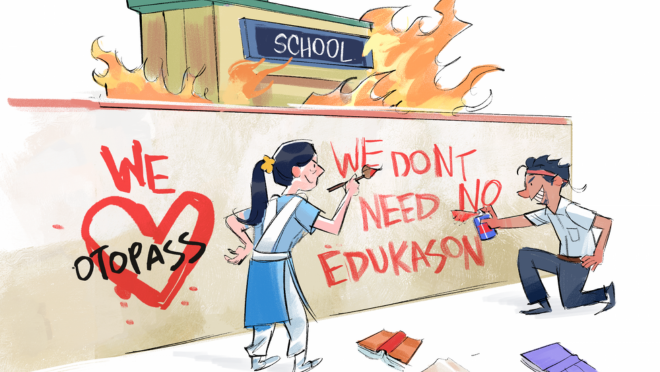Education budget stays under 2% of GDP, falls short of job-oriented goals, say experts
Education budget stays under 2% of GDP, falls short of job-oriented goals, say experts

The finance adviser in his budget speech has highlighted the goal of ensuring quality education and prioritising the creation of a technology-driven, employment-oriented educational environment, but educators are doubtful the goal can be achieved as the proposed education budget for FY26 is below 2% of GDP.
The allocation remains 1.53% of GDP, below the international benchmark of 4-6% by the “Education 2030 Framework for Action” of Unesco. The revised FY25 budget for education was 1.52% of GDP.
Over the past two decades, the education budget has consistently been below 2% of GDP, and educators have pointed out that the increasing costs of educational materials have not been tackled in the new budget.

Infograph: TBS
In the FY26 budget, the government has proposed a substantial 13.44% increase in funding for the education sector. This represents a rise from the Tk84,311 crore allocated in the FY25 revised budget, with the new proposal going up to Tk95,644 crore.
However, the education budget constitutes 12.11% of the total budget, falling short of the 20% recommended by Unesco.
Mohammod Moninoor Roshid, a professor in the Institute of Education and Research (IER), Dhaka University, told TBS, “Given that we are discussing a society free from discrimination, the nation’s expectations from the post-July Movement government were somewhat greater. But the most significant disparity persists in the field of education.”
The number of students and educational institutions has risen at the district level. The cost of living and educational inputs has seen an increase as well. “However, though the allocation has been increased to some extent, compared to the revised FY25 budget, the ratio of GDP has remained the same.”
He said though the budget was expected to create a skilled workforce to overcome the challenges posed by the 4th Industrial Revolution, the proposed allocation is not even close to the Unesco standards.
Noting that a significant issue with the education budget is its improper allocation, he said generally, 20% of the distribution is not executed within a span of 6 to 7 months.
“Ultimately, at the end, a ‘burn money’ approach is put in place to avoid uncertainty in acquiring a new budget.”
In FY26, the proposed allocation for primary and mass education is Tk35,403 crore, which was Tk35,123 crore in the revised FY25 budget. For secondary and higher education, the allocation is Tk47,563 crore, up from the revised Tk39,234 crore in FY25.
Besides, Tk12,678 crore has been proposed for the technical and madrasah education, up from Tk9954 crore for the segment in FY25 revised budget.
However, though the government has proposed VAT exemption on ballpoint pens at the local level, imported pens are likely to be more expensive.
Experts believe despite the local VAT exemption for pens, which are considered educational inputs, the broader concern of managing education expenditure remains unaddressed in the budget.
The cost of education in Bangladesh is significantly high, mainly due to expenses related to tuition or coaching institutes, notebooks, guidebooks, and similar items.
The Unesco Global Education Monitoring Report 2022 points out the financial challenges encountered by families, asserting that families in Bangladesh shoulder an incredible 71% of the entire education expenditure.
In the FY26 budget, Tk2,164 crore has been proposed for the Feeding Programme in government primary schools, while the allocation is Tk1,626 crore to provide revised textbooks for secondary and higher secondary level students.
Besides, a proposal of Tk728 crore has been made to offer scholarships at the Ebtedayi level and to include madrasahs in the MPO.
In his budget speech, the finance adviser said necessary activities are being taken for the human resource development of teachers at all levels, including increasing the bonus of MPO-listed teachers, and providing gratuity.
He said short, medium and long-term reform activities have been started based on the recommendations of the consultation committee formed for the development of primary education.
“There is no alternative to science, technology or technical education to build a strong economic structure. This year’s budget has given special priority to creating the environment for a science-based, technology-driven and employment-oriented education,” he said.


